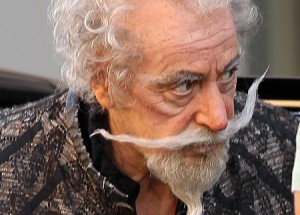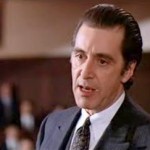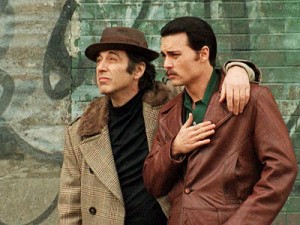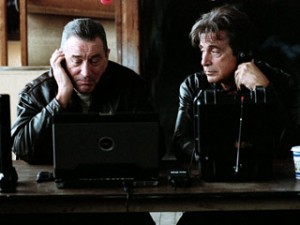This isn’t a review of Jack and Jill. I mean, as if–as if I’d pay to see it (well, OK, maybe a spin on cable, where I recently wasted some time with your co-star Adam Sandler and Jennifer Aniston in Just Tell It Like It Is, or Just Do It, or whatever the hell it was called, the point being that this 2011 release is already on cable, which should tell you something about the disposability of Adam Sandler pictures, even the sort-of funny ones, which Jack and Jill, with its 3% “fresh” rating on Rotten Tomatoes, does not look to be). As if you’d read the reviews, which by now you know better than to do when you make a movie. (The Son of No One, which received more press screenings than actual playdates and thus lived up to its title with audiences, is also at a cellar-dwelling 18% on RT.)
I get why you made Jack and Jill. Hey, Jack Nicholson made an Adam Sandler movie, and no one thinks the worse of him. (We didn’t until we realized that Anger Management would be the basis of Charlie Sheen’s TV comeback, that is.) After spending the better part of a year on The Merchant of Venice onstage in New York, it’s a decent payday, and a chance to be loose and funny (dig that crazy stache!) and to show that you’re with it, that by horndogging Adam Sandler in drag you can send yourself up.
Except that, Al, you’ve been doing that for years. And not intentionally.
 No doubt about it–as stars go, you’re in the firmament. Strong choices in groundbreaking films in the 70s assure that. We don’t have to rehash the glory days–no one who sees those movies ever forgets them. We understood completely why Tony Manero, a guy on the make, hero-worshipped you in Saturday Night Fever (1977), when your career as a leading man was just six years old. We admired your contemporary, Robert De Niro, who played your father across the sands of time in The Godfather:Part II. But back then (I stress the “back then”) he was austere, remote, a little chilly, an actor’s actor, not someone we embraced. But you, Al–you were street, alive, electrifying, New York on two restless legs.
No doubt about it–as stars go, you’re in the firmament. Strong choices in groundbreaking films in the 70s assure that. We don’t have to rehash the glory days–no one who sees those movies ever forgets them. We understood completely why Tony Manero, a guy on the make, hero-worshipped you in Saturday Night Fever (1977), when your career as a leading man was just six years old. We admired your contemporary, Robert De Niro, who played your father across the sands of time in The Godfather:Part II. But back then (I stress the “back then”) he was austere, remote, a little chilly, an actor’s actor, not someone we embraced. But you, Al–you were street, alive, electrifying, New York on two restless legs.
Then the business changed. Street was out as Hollywood went sidewalk and multiplex. With the exception of your “dubiously iconic” role in Scarface (1983) you pretty much said (I paraphrase) “fuck the fucking Warner Brothers” and removed yourself from the 80s, so much so that when you returned for 1989’s Sea of Love Rolling Stone interviewed you for it as if you had retreated to a yurt in the Himalayas for the duration (far enough, anyway, to remove whatever taint Cruising, Author! Author!, and Revolution left on your career).
 Sea of Love wasn’t much, but it’s the sort of unpretentious thriller that “the industry” traffics in, and you were sexy-weary in it, with good hair. You’d made your peace with what Hollywood had become and you were back, working steadily–and unsteadily. The town rewarded your renewed effort by giving you its top honor, the Oscar, in 1993, for Scent of a Woman. But something smelled. After seven nominations you were overdue to win, and the Academy should have awarded you for a more fitting supporting turn for Glengarry Glen Ross that same season. Instead, they went for that big…slab of a performance, blinded and mannered, manic and “hoo-ahhing” for 152 minutes. It’s like you were still burrowing into that snow mountain at the end of Scarface, a movie you’ve never really shaken. Scent of the Woman is the one acclaimed performance of yours I’ve never wanted to revisit.
Sea of Love wasn’t much, but it’s the sort of unpretentious thriller that “the industry” traffics in, and you were sexy-weary in it, with good hair. You’d made your peace with what Hollywood had become and you were back, working steadily–and unsteadily. The town rewarded your renewed effort by giving you its top honor, the Oscar, in 1993, for Scent of a Woman. But something smelled. After seven nominations you were overdue to win, and the Academy should have awarded you for a more fitting supporting turn for Glengarry Glen Ross that same season. Instead, they went for that big…slab of a performance, blinded and mannered, manic and “hoo-ahhing” for 152 minutes. It’s like you were still burrowing into that snow mountain at the end of Scarface, a movie you’ve never really shaken. Scent of the Woman is the one acclaimed performance of yours I’ve never wanted to revisit.
 There have been others. 1993’s Carlito’s Way was Scarface after rehab, a low-key, soulful performance. Who but you could have played the mayor of New York, as you did in City Hall (1996)? There’s that wonderful scene where you and Danny Aiello are horsetrading favors that captures an essence of municipal government. And you’re terrific in Donnie Brasco (1997), an overlooked portrayal of a gangster nobody at the end of the line, purportedly dying of “cancer of the prick,” with a heart-breaking last scene (did you improvise that moment with the fishtank? Genius.) For an actor who can play big, I prefer it when you hold back, or let others do the heavier emotional lifting, showboating, and grandstanding (Carlito’s Way, The Insider, Insomnia).
There have been others. 1993’s Carlito’s Way was Scarface after rehab, a low-key, soulful performance. Who but you could have played the mayor of New York, as you did in City Hall (1996)? There’s that wonderful scene where you and Danny Aiello are horsetrading favors that captures an essence of municipal government. And you’re terrific in Donnie Brasco (1997), an overlooked portrayal of a gangster nobody at the end of the line, purportedly dying of “cancer of the prick,” with a heart-breaking last scene (did you improvise that moment with the fishtank? Genius.) For an actor who can play big, I prefer it when you hold back, or let others do the heavier emotional lifting, showboating, and grandstanding (Carlito’s Way, The Insider, Insomnia).
Because, Al, when you do it, you go beyond big–you go broad, and sloppy. You give us what you and your directors think we want, when what we want is to cover our ears and close our eyes, anything to escape the full Al. Heading an all-star cast you get away with it in Any Given Sunday, where you and loudmouth James Woods go to 11, then 12, then 15 in your big gridiron confrontation, a spectacle we’re glad that Oliver Stone arranged. Too often, though, we’re begging the theater manager for decibel control, take Al down a notch–think The Devil’s Advocate, Simone, The Recruit, Two for the Money. That’s a lot of ham to slice through.
 (Oh, and Heat. You don’t unbalance the movie, which has become emblematic of neo-noir, but I’m relieved when De Niro is around to dry it out. De Niro, who came down from the mountaintop in 1987–“Lou Cyphre” in Angel Heart, remember?—and has spent an awful long time on the wrong side of the tracks since then, in slummy movies. An influence, perhaps? A questionable role model for you, Al. I need to send Bob a letter, but Little Fockers, a movie to make Adam Sandler look like Carl Dreyer, has silenced my pen.)
(Oh, and Heat. You don’t unbalance the movie, which has become emblematic of neo-noir, but I’m relieved when De Niro is around to dry it out. De Niro, who came down from the mountaintop in 1987–“Lou Cyphre” in Angel Heart, remember?—and has spent an awful long time on the wrong side of the tracks since then, in slummy movies. An influence, perhaps? A questionable role model for you, Al. I need to send Bob a letter, but Little Fockers, a movie to make Adam Sandler look like Carl Dreyer, has silenced my pen.)
Al, you’re 71, and like a lot of seniors you’re prey to con artists. Sandler hoodwinked you into making a fool of yourself in Jack and Jill, and the movie came tumbling after a CGI-ed Mickey Rourke in Immortals at the boxoffice. But the fall from “A Film by Francis Ford Coppola” to “A Film by Dennis Dugan” is a lot longer, and sadder. And let’s draw a veil over 2008, shall we? The year you fell into the clutches of Millennium Films, the poor man’s Cannon Films, for whom you ground out two of your stinkiest sausages–Righteous Kill, where you (yelling again) and De Niro (barely awake) cancel out your epic meeting in Heat in a done-to-death good cop/bad cop scenario, and the unbelievable 88 Minutes, a gruel of serial killer, capital punishment, and paranoia cliches, a flat-out desperate script that Tom Sizemore would have swatted at his agent had he received it. Let us not speak of them again.
 All of which suggest monumental indifference to your art, or hardboiled cyncism. Not so–at least, not in the theater, where, with two long-ago Tonys under your belt, you delivered a Shylock that was quite different from the one you played in Michael Radford’s 2004 film of The Merchant of Venice. (Both fine, and I admire the way you wrestle with parts for years on end; Richard III, say, or Herod in Oscar Wilde’s Salome, the basis of a new film of yours.) Or for HBO, an assisted living facility for aging talent, where you’ve earned two Emmys, for Angels in America (excellent) and You Don’t Know Jack, where, as Jack Kevorkian, you played a part fully in sync with your eccentricities and indulgences. Phil Spector (dig that crazy hairstyle!) should be another.
All of which suggest monumental indifference to your art, or hardboiled cyncism. Not so–at least, not in the theater, where, with two long-ago Tonys under your belt, you delivered a Shylock that was quite different from the one you played in Michael Radford’s 2004 film of The Merchant of Venice. (Both fine, and I admire the way you wrestle with parts for years on end; Richard III, say, or Herod in Oscar Wilde’s Salome, the basis of a new film of yours.) Or for HBO, an assisted living facility for aging talent, where you’ve earned two Emmys, for Angels in America (excellent) and You Don’t Know Jack, where, as Jack Kevorkian, you played a part fully in sync with your eccentricities and indulgences. Phil Spector (dig that crazy hairstyle!) should be another.
I sense a pattern here–giving your all to an occasional theater project, putting effort into respectable TV movies, then coasting through whatever scraps of red meat Hollywood has to offer its lions. It’s not all bad news–here’s hoping a planned film of King Lear, directed by Radford, makes it off the heath (and puts you back on Broadway as you find a new obsession). Take the choicest ones, Al. You have a legacy on the big screen, and you should enrich it, not diminish it. Give us films we can give a hoo-ah about.
Respectfully yours,
Bob






Comments